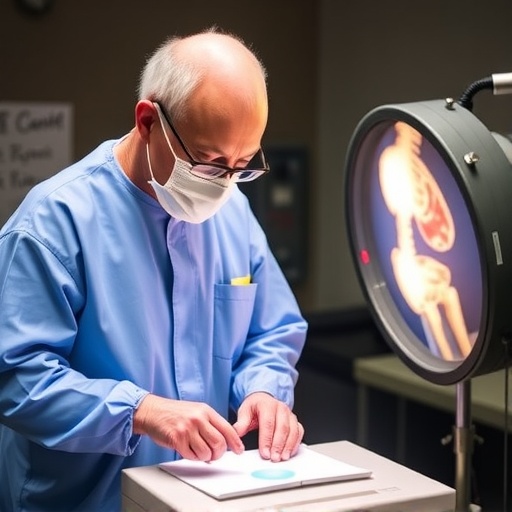In a groundbreaking stride towards unraveling novel therapeutic avenues for Parkinson’s disease, a pilot study published recently in npj Parkinson’s Disease explores the safety and tolerability of fecal microbiota transplantation (FMT) in individuals afflicted by this progressive neurodegenerative disorder. The emerging understanding of the gut-brain axis and the microbiome’s pivotal role in neurological health has propelled investigations into microbial interventions as potential modulators of disease progression. This study marks one of the initial clinical attempts to bridge microbiota science with Parkinson’s pathology, illuminating an innovative frontier in neurotherapeutics.
Parkinson’s disease, affecting millions globally, is traditionally characterized by hallmark motor symptoms such as bradykinesia, tremor, rigidity, and postural instability. However, mounting evidence implicates a complex interplay between central nervous system degeneration and systemic factors, including the gut microbiome. The gut harbors an immense diversity of microbial organisms whose metabolites and immunomodulatory capacities can profoundly influence neuroinflammation and neuronal survival. Researchers hypothesize that by modulating the gut microbial community, it may be possible to alter disease trajectory or alleviate symptom burden.
This pilot trial represents a vital early step in assessing whether FMT, the transfer of fecal microbial constituents from healthy donors, can be safely administered to Parkinson’s patients without inducing adverse clinical or immunological effects. The study enrolled a small cohort of individuals diagnosed with idiopathic Parkinson’s disease, administering donor-derived microbiota via colonoscopic infusion under meticulously controlled clinical conditions. Comprehensive safety monitoring included neurological assessments, blood biomarkers, and adverse event surveillance over an extended follow-up period.
Initial findings demonstrate that FMT was generally well tolerated, with no serious adverse events attributable to the intervention. Mild gastrointestinal symptoms were transiently reported, consistent with typical post-FMT reactions observed in other conditions such as Clostridioides difficile infection. Importantly, no exacerbations of Parkinsonian motor symptoms or neuropsychiatric complications emerged, underscoring the feasibility of FMT as a potential adjunctive strategy in this patient population.
Beyond safety, the study probed alterations in gut microbial diversity and composition pre- and post-transplantation using high-throughput sequencing techniques. Data revealed engraftment of donor microbiota signatures within recipients’ intestinal ecosystems, indicating successful microbial transfer and colonization. Notably, shifts towards increased abundance of short-chain fatty acid-producing bacteria were observed. These metabolites are known to exert anti-inflammatory and neuroprotective effects, which might have downstream benefits in neurodegenerative conditions.
The mechanistic implications of gut dysbiosis in Parkinson’s pathogenesis continue to be elucidated. Alpha-synuclein aggregates, a neuropathological hallmark of Parkinson’s disease, have been detected in enteric neurons well before central nervous system manifestations. This suggests a prion-like propagation of pathology from the gut to the brain via the vagus nerve, potentially modulated by microbiota-driven inflammation and permeability changes in the intestinal barrier. By reconstituting a healthier microbial milieu, FMT could interrupt these pathological cascades.
This pioneering work, however, is preliminary and primarily focused on establishing a safety profile rather than efficacy endpoints. As such, the study’s sample size and open-label design limit definitive conclusions regarding clinical benefit. Yet, it sets the foundation for future randomized, placebo-controlled trials that will robustly evaluate whether microbiota modulation can mitigate Parkinsonian symptoms or modify disease progression.
The complexity of Parkinson’s disease necessitates multifactorial therapeutic strategies. Conventional pharmacological treatments, primarily dopamine replacement, address motor symptoms but do not halt neurodegeneration. The integration of gut microbiome-targeted therapies represents a paradigm shift, targeting systemic contributors to neural health from outside the brain. The potential to harness a patient’s own microbiota as a therapeutic modality or to engineer microbiota consortia to deliver neuroprotective metabolites is a tantalizing prospect.
Moreover, the personalized nature of microbiota ecosystems impels the development of precision medicine approaches. Variability in baseline microbial composition, host genetics, diet, and environmental exposures may influence the success of FMT or related interventions. Characterizing these variables will be crucial in optimizing donor selection and transplantation protocols tailored to individual patient profiles.
The quest to elucidate gut-brain interactions in Parkinson’s also opens avenues for biomarker discovery. Microbial signatures and metabolite profiles might serve as diagnostic tools, predictors of disease progression, or indicators of therapeutic response. Incorporating microbiome analyses into clinical workflows could revolutionize disease monitoring and management paradigms.
Importantly, ethical and logistical considerations accompany the clinical application of FMT. Ensuring donor screening for infectious agents, standardizing transplantation procedures, and addressing regulatory frameworks are essential to safeguard patient safety. As the field evolves, protocols must adapt to balance innovation with rigor.
In conclusion, this pilot study illuminates fecal microbiota transplantation as a safe and tolerable intervention in Parkinson’s disease, inaugurating a new research trajectory focusing on microbial therapeutics in neurodegeneration. The convergence of neurology and microbiology promises transformative impacts, contingent on robust trial designs and multidisciplinary collaboration. As researchers probe deeper into microbial modulation of brain health, the prospect of microbiome-based interventions may usher in a new era of holistic management for Parkinson’s and beyond.
Continued investigation with larger cohorts, extended follow-ups, and integrated multi-omics analyses will be pivotal in translating these early findings into clinical practice. Harnessing the gut microbiota’s full therapeutic potential could redefine our approach to neurodegenerative diseases, shifting from purely symptomatic treatment to disease modification driven by the intimate dialogue between gut and brain.
The scientific community eagerly anticipates forthcoming trials that will validate and expand upon these promising results, providing hope for patients confronted with Parkinson’s disease’s relentless progression. As the microbiome’s intricate role unravels, FMT and related interventions stand poised to become crucial components of future neurotherapeutic arsenals.
Subject of Research: Safety and tolerability of fecal microbiota transplantation in Parkinson’s disease patients.
Article Title: Faecal microbiota transplant in Parkinson’s disease: pilot study to establish safety & tolerability.
Article References:
De Sciscio, M., Bryant, R.V., Haylock-Jacobs, S. et al. Faecal microbiota transplant in Parkinson’s disease: pilot study to establish safety & tolerability. npj Parkinsons Dis. 11, 203 (2025). https://doi.org/10.1038/s41531-025-01061-5
Image Credits: AI Generated




